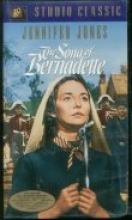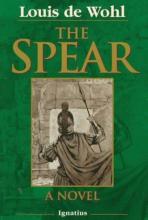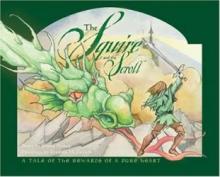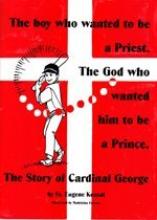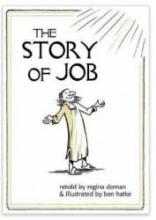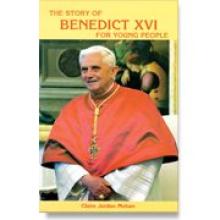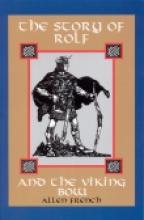No name
The Song of Bernadette
black and white, 156 min
The Spear
A fast-paced fictionalized account of the centurion who thrust the spear into the side of Christ. The book was clearly written for adults, but might be suitable for older teens. There is a great deal of violence (as might be expected), an attempted suicide, and other content appropriate for those with some degree of maturity. The story is very Catholic and the author weaves many Catholic ideas and thought into the conversations of the characters as well as showing how much people of that time (particularly the Romans) were in need of the message of Christ. The centurion in particular (Cassius Longinus) has lost all faith in fellow man and life in this world until he begins hearing about the Rabbi Yeshua and his followers. The immense quantity of well-researched historical details add a lot to the story as well.
There is a scene in which a woman commits adultery (the same woman who Jesus saves from stoning). While the issue is important and is handled well, their attraction for each other might be described in a too-sensual way for some teens.
The Squire and the Scroll
As in the journey of Ulysses, they encounter several trials along their quest, in their case, testing the purity of their senses. Will they survive the tests or succumb to the same fate as all the other knights? In the story, children will be challenged on many levels. Will they follow the example of the squire or the knight? Will they obey their parents and listen to the wisdom of God's word or will they succumb to the enticements of the world? Will they guard their purity or squander it? Will they receive as the squire hopes "the promise of a reward from God in return for faithfully guarding his heart?"
originally appeared in Heart and Mind Magazine, Summer 2005 - used with permission
The Story About Ping
This is a well-loved book in our family - particularly in the preschool set. The illustrations are beautiful, the story simple and meaningful and the lessons timeless.
The Story of Cardinal George
The Story of Job
The Story of Mozart (Music Masters Series)
There is one troubling part, however. Even according to the Catholic Encyclopedia, Mozart was apparently involved in the Freemasons which are an anti-Catholic society (membership in the society is forbidden to Catholics). This story mentions that the opera The Magic Flute contains symbols of Freemasonry of which Mozart was a member. Some Catholic parents have asked if it is appropriate to have their children listen to Mozart and in fact develop a "relationship" with his music and operas, given this connection.
I would answer that the music is suitable to listen to for several reasons. First, although we do know that Mozart was a freemason (his personality does appear to be naive enough to be involved with this, although not necessarily caught up in the anti-Catholic aspects of it), it is difficult to know
60:27 Minutes Audio (CD or Cassette)
The Story of Pope Benedict XVI for Young People
The Story of Rolf and the Viking Bow
One night, while a storm rages, Hiarandi's wife convinces him to light a beacon fire to help a ship which is foundering off the coast. This is not the normal practice of the time as the coast dwellers have come to rely on the booty from wrecked ships. His actions set off a chain of events which eventually lead to his own demise. The owner of the ship is Hiarandi's brother, Kiartan. Instead of thanking Hiarandi, Kiartan steals from him and leaves him to answer for a crime that Kiartan commits.
At the "Althing" meeting, Hiarandi's covetous neighbor, Einar, charges Hiarandi with the blood debt for Kiartan's crime. Einar wins a lesser judgement against Hiarandi, however, and Hiarandi is sentenced to remain on his own property for one year, that is, not to step off it more than one bow's-shot distance. Just before the year is over, Einar's men convince Hiarandi's only remaining thrall to run away. Hiarandi chases him to within one bow's shot distance but Einar's men are waiting and kill Hiarandi. Rolf, who witnesses the whole incident, kills one of the attackers and wounds several others. Einar claims that Hiarandi stepped out of bow shot distance from his property and so his death was legal. Although his own bow shot falls some feet short of the distance, Rolf insists that someone could be found to shoot the distance and prove his father's innocence. So he travels to seek someone who can shoot better than he. Along the way he wins the loyalty of many influential men and warriors who take up his cause, but none can shoot far enough.
Finally Rolf is outlawed for the death of Einar's man and he and his cousin flee Iceland. Einar gains Hiarandi's property and lives in the house which should have been Rolf's. While at sea, Rolf's ship is captured by Vikings and he and his cousin are taken captive. The Vikings are then defeated and captured by Orkney men. Rolf and his cousin are unlawfully made thralls of the Icelandic foster son of a thane of Orkney. This boy, Grani, lacks all the virtue Rolf possesses yet Rolf is able to teach him many things. They survive a Viking attack together and travel to warn the Earl of Orkney of the Viking invaders, becoming friends along the way. In all this adventure, Rolf acquires the bow from the burial mound of a Viking warrior.
Grani frees Rolf from his thralldom but as they return to Iceland, Grani reveals that his birth father is Einar. In his pride Grani will not ask Rolf forgiveness for all the wrongs he has done him since his capture so they must go to shore as enemies. Their ship crashes off the coast and Rolf rescues Grani bringing him to Einar's house. After escaping capture, Rolf disguises himself as a woman and lives a few months at his mother's dwelling up the hill from Einar and Grani.
At a harvest feast at Einar's house, in a marvelous scene, Rolf arrives disguised as the woman and shoots the Viking bow the distance to where his father fell, thus proving his death unlawful. Einar must forfeit the property and live up the hill at the dwelling where Rolf's mother had been. Rolf sends Einar and Grani trouble after trouble until Grani's pride finally breaks and he begs Rolf's forgiveness. Rolf immediately forgives him and they are restored as neighbors and friends and the unlucky curse on the Soursop line is ended.
Although this adventure is the story of Rolf's steadfast victory over his evil circumstances, it is also the story of the maturation of Grani. He begins as a self-indulged, selfish and wrongfully proud boy and he grows into an honorable man. All along the way he can see that Rolf is in the right, but he cannot bring himself to admit it to Rolf. Finally his will accepts what his heart knew all along. The last chapter of the book is drawn masterfully to this conclusion and is as satisfying as the scene where Rolf's bow shot vindicates his father.
There is much more to the story than this summary can cover. It is full of details of Icelandic and Orkney life and of the legal system to which the people are bound. The fact that it is written entirely, flawlessly as a Norse saga lends it authenticity and makes it a joy to read.
Recommended for grades seven and up

